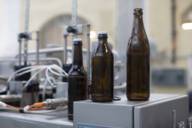
Special tours: At Weihenstephan research brewery, you can breathe in the spirit of the Purity Law – and learn everything there is to know about Munich's favorite beverage.
As most Germans will be able to tell you on the spot, the purity law of beer brewing decrees that beer must consist of hops, malt, water and yeast. If you visit Munich, you and your colleagues have the chance to take a look behind the scenes: The Weihenstephan research brewery has opened its doors to us for a group tour.
Christoph Neugrodda is the technical manager at the brewery and an expert on what is probably Germany’s most beloved beverage. As a research brewery, Weihenstephan stands at a fascinating intersection between practice and science: "At the institute, we engage with scientific theses, and put them into practice", Neugrodda explains. The Weihenstephan research brewery is part of the Technical University of Munich. In addition to common brewing processes, its students have the chance to gain knowledge about the microbiological principles of yeast and lactic acid bacteria and learn how to perceive bitter substances or evaluate malt – it’s an exciting place for everyone who wants to delve deeper into the creation of new beer varieties.
Our tour of the research brewery begins at the end – in the sensory room. This is where the finished product is tasted. In white chambers, equipped with only a small window – that bear some resemblance to voting booths – the scientists are able to commit themselves to the tasting without any distractions. "Here you are sealed off from environmental influences," Neugrodda asserts. As soon as one sample glass has been emptied, another one arrives – at the push of a button.
During their regular tastings, Mr. Neugrodda and his colleagues check the beers for their sensory quality. Beer aromas are used for training purposes. Seeing them all lined up in small bottles, one can’t help but think of the inside of a perfumery. Off-flavors include diacetyl, a butter aroma, or dimethyl sulfide, which smells a lot like cooked corn. Desirable notes, on the other hand, include peach, vanilla or clove. Public tastings are also part of a tour of the brewery – however, the best is saved for last.
The brewhouse is where our tour really begins. One thing that becomes apparent right away is that there is a lot of room for variation when producing beer. A crucial step in the process is the mixing of different types of malt (the germinated and dried grain); after all, this mixture determines the taste and color of a beer. There are more than 50 different types of malt – dark, light or sour malt, to name but a few. At the same time, they can be used in a wide variety of ways, adding flavors such as caramel or smoky notes to the popular golden beverage. Naturally, there is never a dull moment in the brewery.
The purity law of beer brewing is applied at Weihenstephan research brewery – as it is in every part of Germany. Despite the restrictions it imposes, Mr. Neugrodda finds it compelling to abide by it: "Producing interesting beers within these rules is an art in itself", he says.
MICE groups here get a sense of how important each component is when four ingredients must suffice - that includes water. "It used to be that the water dictated the type of beer," Mr. Neugrodda explains. "The rule was: hard water for darker beers. That's why Munich beer was dark. For Pilsen beer, a very light beer, you needed very soft water."
For the grand finale of the tour, guests are invited to a tasting in the fermentation cellar. Here, Mr. Neugrodda puts the brewery's most important utensil to use: the Zwickel, a small silver tap. With this, the sample, the so-called Zwickel beer, is tapped. Beer flows from the tank in beautiful hues of gold and orange.
In order to take in all the flavor nuances of a beer, Neugrodda says it's important to flood the mouth – and actually swallow the beer. "With beer, there's what's called retronasal perception. When I taste wine or even coffee, I can spit it out afterwards. With beer, it's like some of the aromatics are brought back up after you swallow."
However, Weihenstephan wants to devote itself to one thing above all else – research. For this reason, the brewery doesn't offer tours on a regular basis, but by special request only. "When we are approached by someone who piques our interest, we are happy to give a tour", they tell us. Thus, MICE groups who fancy a look are welcome to enquire about private tours any time. In addition, the Weihenstephan State Brewery next door offers tours in German and English from Monday to Wednesday.
To get in touch with the brewery, MICE groups can send an email to: verwaltung@bgt.wzw.tum.de